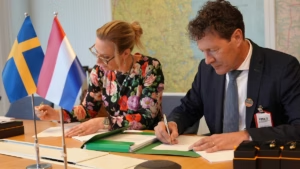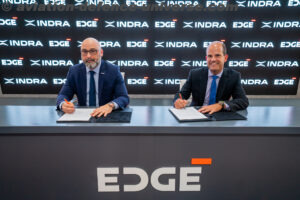London. 13 September 2024 . Spaceflux, a leading provider of Space Situational Awareness (SSA) solutions, has been awarded the “Infra-Red Sensor Technology Demonstrator System for Space Domain Awareness” contract by the Defence Science and Technology Laboratory (Dstl), a UK Ministry of Defence’s (MOD) executive agency.
The contract to design and build an infrared telescope testbed to de-risk the technology for ground-based surveillance and characterisation of satellites marks a significant milestone in the company’s commitment to advancing SSA capabilities and reinforces the firm’s position as a world leader in SSA. This project will be led by Spaceflux’s new innovation hub, Spaceflux Labs, a dedicated research division that will propel the future of SSA technology.
Spaceflux Unveils Unique Daytime Satellite Tracking Capabilities
Spaceflux’s innovative solution features a large optical telescope equipped with two cameras, integrating both Short-Wave Infrared (SWIR) and visible sensors. This advanced setup will enable daylight tracking and unprecedented characterisation capabilities of satellites and space debris across all orbital regimes. Daylight tracking expands the operational window for tracking space objects beyond nighttime observation, allowing for 24/7 monitoring. This will help mitigate potential collisions, prevent accidental interference with operational satellites or missions and reduce the risk from in-space hazards. Advanced characterisation on the other hand, improves understanding of the behaviour of such objects and helps to optimise satellite deployments, de-orbiting procedures, and other space operations in increasingly congested orbital environments.
As part of the project, Spaceflux will enhance its existing data analytics platform, Cortex, to further improve the characterisation of space objects. These enhancements will be integrated into the Spaceflux Miru Stations, a fully integrated optical SST (Space Surveillance and Tracking) system, and the Track & Guard service, further enriching the company’s product offering capabilities.
The new infrared sensor system will be installed at the firm’s observatory in Spain, a strategic location that benefits from optimal weather conditions for infrared observations. Following the installation, Spaceflux will conduct a series of experiments over several months, and the results will be delivered to Dstl for assessment. Following the technology demonstrator, the company will integrate this advanced sensor into its global network permanently, enhancing Spaceflux’s ability to provide high-quality, timely space situational awareness data to its clients.
Marco Rocchetto, CEO of Spaceflux, commented, “Winning this Dstl contract is a testament to Spaceflux’s commitment to pushing the boundaries of space technology. By integrating innovative sensor technologies with our AI-driven analytics platform, CORTEX, we are poised to advance the UK’s capabilities in Space Domain Awareness significantly.”
Dr William Feline, Senior Principal Scientist at Dstl, commented, “Dstl are delighted to be working with Spaceflux in this novel and exciting area of research. We hope that this project will lead to significant enhancements in the UK’s sovereign SSA capabilities in support of the National Space Operations Centre (NSpOC).”
Launch of Spaceflux Labs: A Hub for Innovation and Collaboration
In tandem with the recent Dstl contract award, Spaceflux is thrilled to announce the official launch of Spaceflux Labs on October 1st 2024. Situated in London, Spaceflux Labs will serve as a dynamic hub of innovation, committed to pushing the boundaries of Space Domain Awareness through advanced research and close collaboration with customers and partners. Spaceflux Labs will act as a collaborative nexus, facilitating engagement with leading academic research in AI and Space Situational Awareness to accelerate the translation of cutting-edge science into market-ready solutions.
Led by Prof. Ingo Waldmann, one of Spaceflux’s co-founders and a distinguished astrophysics professor at University College London, Spaceflux Labs will focus on pioneering projects such as self-calibrating sensors, track-before-detect technologies, and sensor fusion. These initiatives aim to enhance the detection capabilities of smaller and fainter objects in space, contributing to global efforts to ensure a safer and more sustainable orbital environment.
Prof. Waldmann, who will be joining Spaceflux full-time as Chief Technology Officer (CTO) to lead the Labs, stated, “Spaceflux Labs represents the next chapter in our journey to revolutionise space situational awareness. Our goal is to drive innovation in AI and sensor technologies, fostering collaboration and co-creation with our partners to deliver transformative solutions that meet the challenges of tomorrow.”
This dual achievement showcases Spaceflux’s leadership and expertise in the field of space situational awareness and aligns with the firm’s recent successes and strategic objectives in the UK. This project not only advances Spaceflux’s technological capabilities, but also positions the company for future opportunities to supply next-generation state-of-the-art systems to other clients.




































































































































